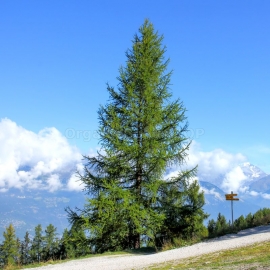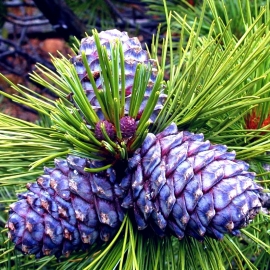



Organic European Larch Seeds (Larix Decidua)
1.14 €
L. decidua is a medium-size to large deciduous coniferous tree reaching 25-45m tall, with a trunk up to 1m diameter (exceptionally, to 55m tall and 2 m diameter). The crown is conic when young, becoming broad with age.
-
Organic European Larch (Larix Decidua)
L. decidua is a medium-size to large deciduous coniferous tree reaching 25-45m tall, with a trunk up to 1m diameter (exceptionally, to 55m tall and 2 m diameter).
The crown is conic when young, becoming broad with age; the main branches are level to upswept, with the side branches often pendulous. The shoots are dimorphic, with growth divided into long shoots (typically 10-50cm long) and bearing several buds, and short shoots only 1-2mm long with only a single bud. The leaves are needle-like, light green, 2-4cm long which turn bright yellow before they fall in the autumn, leaving the pale yellow-buff shoots bare until the next spring.
The cones are erect, ovoid-conic, 2-6cm long, with 30-70 erect or slightly incurved (not reflexed) seed scales; they are green variably flushed red when immature, turning brown and opening to release the seeds when mature, 4–6 months after pollination. The old cones commonly remain on the tree for many years, turning dull grey-black. It is very cold tolerant, able to survive winter temperatures down to at least -50°C, and is among the tree line trees in the Alps, reaching 2400m altitude, though most abundant from 1000-2000m.
It only grows on well-drained soils, avoiding waterlogged ground.The seeds are an important food for some birds, notably Siskin, Lesser Redpoll and Citril Finch, while the buds and immature cones are eaten by Capercaillie. See also List of Lepidoptera that feed on larches European Larch needles are the only known food for caterpillars of the case-bearer moth Coleophora sibiricella; its cone scales are used as food by the caterpillars of the tortrix moth Cydia illutana.
Products Viewed Before
Product code: 4275
1.50 €
Pinus siberica belongs to the family of the Pinaceae, the pine trees. This pine tree species is native to Siberia. Due to that is also known as Siberian yellow pine. In Siberia it occurs in big populations that cover big areas. Those populations are mostl

